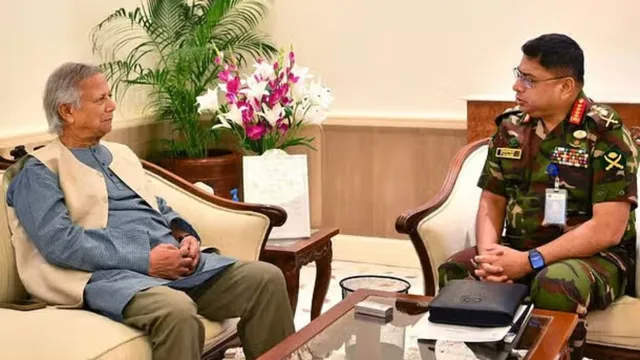- By Supratik Das
- Fri, 23 May 2025 09:15 AM (IST)
- Source:JND
In a political drama echoing Pakistan’s troubled civil-military history, the interim government chief of Bangladesh, Professor Muhammad Yunus, is said to be considering resignation amidst escalating tensions with the Army and a deepening political scenario. In a report late Thursday by BBC Bangla, Yunus expressed his worries with student-led National Citizen Party (NCP) leader Nahid Islam that political consensus is rendering it "impossible to govern." "Sir said he is considering resigning. He does not feel he can work unless there is a common understanding among the political parties," Nahid Islam informed the broadcaster. The move has fueled rumors of Bangladesh slipping into the sort of politically troubled military-dominated crisis that has plagued Pakistan for decades, with Yunus said to be under pressure from the military hierarchy headed by Army Chief General Waker-Uz-Zaman.
Strain between Army Chief Waker-Uz-Zaman Widens
According to the sources quoted by CNN-News18 indicate that the divide between Yunus and the army chief has grown. Zaman was appointed as Army Chief in June 2024, has expressed displeasure over Yunus’s decisions, especially his controversial executive orders releasing political prisoners and the appointment of a National Security Advisor without consulting the military. In a dramatic turn of events, Quartermaster General Lt Gen Mohammad Faizur Rahman, who is considered pro-Islamist and sympathetic towards Pakistan, was said to have secretly met with NSA Khalilur Rahman, Yunus's aide, again adding further speculations. On the other hand, Yunus was reportedly trying to sideline Zaman, possibly backed by the foreigners, amidst allegations of foreign intervention.
Earlier this month, in a recent speech to top officers, General Zaman made a veiled threat that was widely seen as a signal of a looming coup: "I've had enough in the last 7-8 months. I'm warning you, so you don't say tomorrow I didn't tell you." The statement comes amid Zaman’s growing frustration with the interim government’s failure to stabilize the country. He has been reported to have initiated backchannel talks with Sheikh Hasina and Khaleda Zia's parties to bring about early elections and the withdrawal of the military. Yunus, however, has held firm that elections will take place only after reforms have been finished, possibly running until June 2026, while Zaman is seeking elections by December 2025.
The events in Dhaka have had ominous similarities with the dynamics of Pakistan's civil-military, with elected governments having long been eclipsed by an influential army. The Yunus-Zaman rift has echoed similar recent strains in Pakistan between Prime Minister Shehbaz Sharif and the Rawalpindi establishment. Ever since it gained independence in 1947, Pakistan's military has ruled the nation directly for more than 30 years, staging three significant coups and still maintaining control even under civilian regimes. No Prime Minister in Pakistani history has ever served a complete five-year term; most have been forced into exile, jailed, or worse.
Also read: 'Send Suicide Bombers To Kolkata': Bangladesh Islamist Cites Taliban Tactics | Watch
As Bangladesh hangs in the balance of an imminent political-military crisis, South Asian diplomatic circles are increasingly on edge. The Indian government, already coping with cross-border tensions and terror attacks from Pakistan. With the NCP asking Yunus to remain for the interests of "national security and democratic aspirations," and the army insisting on a quicker return to elected governance, Bangladesh is at a juncture.

